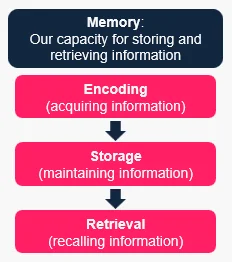Introduce retrieval practice to reduce re-teaching

Retrieval practice is part of the working memory model (see diagram, right).
When pupils recall information from their long-term memory into their working memory, they get better at retrieving that information. Next time they need to recall it, they will find it easier.
It also helps prevent cognitive overload for pupils and reduces re-teaching, saving teachers time in the classroom.
Embedding retrieval practice across your school can help you achieve what the Ofsted inspection handbook refers to as effective "implementation" of the curriculum. Inspectors will consider how the subject curriculum is presented to make sure pupils can transfer key knowledge to long-term memory and apply it fluently (section 212).
Read our jargon buster for more detail about retrieval practice.
Create a culture of retrieval practice in your school
Teachers need to really understand why retrieval practice works in order to use it effectively in

